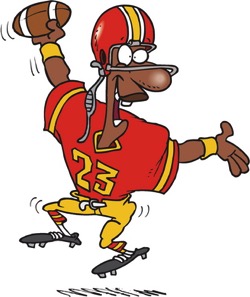Game Plan
 Here’s the problem with sports’ analogies: Even though football is the most popular American sport, not everyone likes football, and those who don’t, understand it even less.
Here’s the problem with sports’ analogies: Even though football is the most popular American sport, not everyone likes football, and those who don’t, understand it even less.
With that caveat out of the way, I will still kick off this post with this: To score without a game plan has worse odds than being successful on “3rd and 20.”
Like losing football teams, many of us have only one game plan – the same one we execute day after day even though it’s not working.
Here are two things I’ve come to realize over the years:
1. A game plan cannot be in cement.
2. We need more than one.
The less flexible your plan, the more often you’ll lose. When you get married to one way of doing things, you divorce your options.
I’m all for sticking with a plan that’s working. If you’ll indulge me another football reference, I will run over right tackle until they stop me. But if you continue to run that play after being stopped time after time, it’s like playing football without a helmet – you’ll be dazed and confused and you will lose.
The most successful skill to develop in game planning is to recognize that the one you have in place isn’t working. It’s not that we can’t see our plan’s lack of results; it’s more an issue of pride of ownership that gets in our way.
One way to counter our pride is just a simple shift in language. Refer to your plan as “THE Plan,” rather than “MY Plan.” I’m amazed, ’til this day, with people who claim ownership of things not working.
Here’s an excerpt from my free ebook, The Success Triangle that sheds more light on this misuse of language:
. . . Suppose you say you are “Shy,” “Not artistic,” “Clumsy,” or “Not very smart.” These are expressions that hold you in place. I am not suggesting that you say an affirmation like “I am artistic.” I believe part of your mind knows that is not accurate. If you believe you are not artistic and want to change your belief, a place to start is “In the past.”
“In the past” is a phrase that works its own magic when continuously applied. If it is your habit to say, “I’m not very artistic,” say something like this instead. “In the past, I haven’t been very artistic.” The consistent referencing of the observation as “In the past,” is a pattern interrupt. The pattern interrupt, “In the past,” sets the stage for your mind to come up with additional options that will move you forward and have your talent gush out.
Many people hold their state of health in place with words. The most destructive label is the word “My.” “My arthritis” won’t allow me to play tennis anymore. “My diabetes” leaves me with little energy. Two things that will give you more power immediately are:
1. Drop the word “My” from any disease process.
2. Apply “In the past” to any limitation you ascribe to the disease.
For example: “In the past, arthritis has kept me from playing tennis.” “In the past, diabetes has caused me to feel less energetic.”
“My” is a word, to which we’ve been conditioned, that means ownership. Who wants to own arthritis? I’m not suggesting this shift in language will make arthritis or diabetes disappear. What I’m suggesting is, if you refer to it “In the past” and remove the ownership, you may find your situation more palatable. Better yet, if there is a way your mind can help you ease or put this disease behind you, this new language will facilitate the process.
Your goal in life may never change but to have a better chance of reaching it, your game plan has to – perhaps, multiple times, and often in mid stream.
I don’t know where I first heard it but it has stuck with me ever since: “The most flexible person wins.”
Be open to more flexibility when planning the game of life and you’ll be able to show off your “Touchdown Dance” more often.
All the best,
John
Be Sociable, Share!

